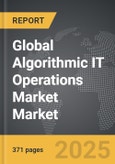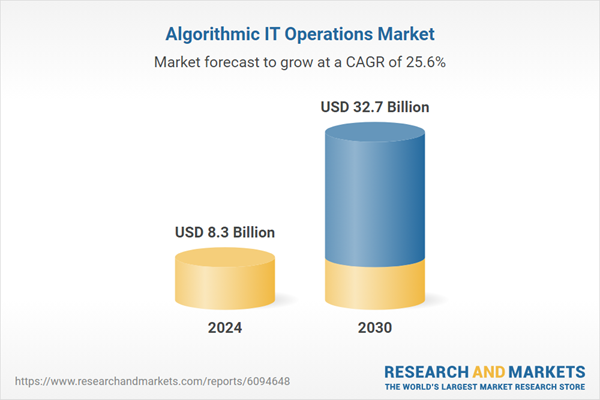Global Algorithmic IT Operations Market - Key Trends & Drivers Summarized
Why Is Algorithmic IT Operations Becoming Essential in Today's Digital Enterprise?
As enterprise IT systems become increasingly complex and dynamic, Algorithmic IT Operations (AIOps) is emerging as a strategic necessity rather than a futuristic luxury. AIOps refers to the application of artificial intelligence and machine learning to automate and enhance IT operations, allowing for faster decision-making, proactive issue resolution, and deeper insights into infrastructure behavior. Traditional IT operations, often reliant on static rules and manual processes, are no longer sufficient to keep up with the volume, velocity, and variety of data generated across digital ecosystems. Enterprises are managing a hybrid mix of cloud services, on-premise servers, containerized applications, and edge devices - all of which produce continuous telemetry data. Without algorithmic assistance, identifying anomalies, predicting outages, or correlating performance across platforms becomes not just difficult, but impractical. AIOps platforms analyze logs, metrics, events, and traces in real time, detecting patterns and anomalies that human teams might miss. This allows organizations to shift from reactive firefighting to proactive and even preventive management. Moreover, the business impact is significant - improving system uptime, enhancing customer experience, and reducing operational costs. With digital transformation accelerating in virtually every industry, AIOps is rapidly becoming a foundational layer in modern IT strategies, helping companies maintain service continuity while supporting innovation and agility.How Are Advancements in AI and Data Analytics Revolutionizing AIOps Platforms?
The growth and maturity of AIOps platforms are largely driven by parallel advances in artificial intelligence, big data processing, and real-time analytics. Machine learning algorithms have evolved from simple pattern recognition to advanced predictive models capable of identifying subtle indicators of future system degradation or failures. Natural language processing (NLP) is being increasingly integrated to interpret logs, documentation, and service tickets, allowing AIOps tools to 'understand' unstructured data and extract actionable insights. Event correlation engines are becoming more intelligent, automatically grouping related alerts and assigning them meaningful context - reducing noise and enabling IT teams to prioritize effectively. Scalability has improved with the adoption of cloud-native technologies, enabling AIOps platforms to ingest and analyze massive data streams across globally distributed systems. Additionally, the integration of automation workflows, such as auto-remediation scripts and intelligent incident routing, allows AIOps to move beyond analysis into full operational execution. These systems can now suggest or implement fixes without human intervention, dramatically accelerating resolution times. Visualization tools are also evolving, offering intuitive dashboards and anomaly maps that help IT leaders make data-driven decisions. As enterprises collect more telemetry data from applications, networks, and infrastructure, AIOps platforms are becoming not just support systems, but strategic enablers that align IT health with business objectives in real-time.What Market Forces Are Shaping the Global Demand for AIOps Solutions?
The global appetite for AIOps is being fueled by several converging market forces that span technology, business, and regulatory domains. One of the most prominent drivers is the explosion of data created by modern IT environments - data that must be processed in real time to support always-on digital services. With cloud adoption, DevOps practices, and agile development cycles becoming the norm, IT operations teams are under unprecedented pressure to ensure performance, reliability, and security. At the same time, customer expectations have shifted toward instant gratification and zero downtime, meaning even brief service disruptions can result in revenue loss and reputational damage. Regulatory compliance also plays a role, as industries like finance, healthcare, and telecommunications face strict requirements around system auditing, availability, and risk management - areas where AIOps can provide continuous monitoring and reporting. Workforce constraints, such as the shortage of skilled IT professionals, further underscore the need for intelligent automation to augment human capabilities. Vendors and managed service providers are responding by embedding AIOps into broader IT service management (ITSM), observability, and cybersecurity platforms, creating a unified solution landscape. Additionally, strategic interest from CIOs and CTOs is pushing AIOps adoption beyond experimentation into enterprise-wide deployments. These market forces are collectively reshaping expectations of IT operations, making real-time intelligence and automated execution central to competitive advantage in the digital era.What Are the Primary Drivers Accelerating the Growth of the AIOps Market?
The growth of the Algorithmic IT Operations market is propelled by a combination of enterprise digitization, cost-efficiency imperatives, technological readiness, and an expanding vendor ecosystem. As companies pursue digital first strategies, their IT environments become more complex, often spanning hybrid and multi-cloud infrastructures. This architectural complexity generates data at an unprecedented scale, which traditional tools and human teams struggle to interpret and manage. AIOps fills this gap by enabling intelligent data processing, anomaly detection, and incident prediction - delivering value in both speed and accuracy. Cost-saving potential is another major driver; by reducing mean time to resolution (MTTR), minimizing false alerts, and automating repetitive tasks, AIOps significantly lowers operational expenses. Enterprises are increasingly focusing on outcomes like service reliability, customer experience, and business continuity - all of which benefit directly from predictive and self-healing systems. Additionally, the growing interoperability of AIOps platforms with existing IT management tools, such as network monitoring, application performance management, and configuration databases, is accelerating implementation and return on investment. Vendors are also offering flexible deployment models - SaaS, on-premise, and hybrid - allowing organizations to adopt AIOps in a way that fits their existing infrastructure and compliance requirements. With cybersecurity concerns also rising, AIOps capabilities are expanding into threat detection and response, making it a cross-functional asset. As AI algorithms mature and data pipelines become more efficient, the scalability and precision of AIOps solutions will continue to improve - solidifying its position as a key enabler of resilient, intelligent, and future-ready IT operations.Report Scope
The report analyzes the Algorithmic IT Operations market, presented in terms of market value (US$). The analysis covers the key segments and geographic regions outlined below:- Segments: Offering (Platforms Offering, Services Offering); Type (Cloud Type, On-Premise Type); Application (SMEs Application, Large Enterprises Application).
- Geographic Regions/Countries: World; United States; Canada; Japan; China; Europe (France; Germany; Italy; United Kingdom; Spain; Russia; and Rest of Europe); Asia-Pacific (Australia; India; South Korea; and Rest of Asia-Pacific); Latin America (Argentina; Brazil; Mexico; and Rest of Latin America); Middle East (Iran; Israel; Saudi Arabia; United Arab Emirates; and Rest of Middle East); and Africa.
Key Insights:
- Market Growth: Understand the significant growth trajectory of the Platforms Offering segment, which is expected to reach US$19 Billion by 2030 with a CAGR of a 22.5%. The Services Offering segment is also set to grow at 30.8% CAGR over the analysis period.
- Regional Analysis: Gain insights into the U.S. market, valued at $2.3 Billion in 2024, and China, forecasted to grow at an impressive 33.3% CAGR to reach $7.9 Billion by 2030. Discover growth trends in other key regions, including Japan, Canada, Germany, and the Asia-Pacific.
Why You Should Buy This Report:
- Detailed Market Analysis: Access a thorough analysis of the Global Algorithmic IT Operations Market, covering all major geographic regions and market segments.
- Competitive Insights: Get an overview of the competitive landscape, including the market presence of major players across different geographies.
- Future Trends and Drivers: Understand the key trends and drivers shaping the future of the Global Algorithmic IT Operations Market.
- Actionable Insights: Benefit from actionable insights that can help you identify new revenue opportunities and make strategic business decisions.
Key Questions Answered:
- How is the Global Algorithmic IT Operations Market expected to evolve by 2030?
- What are the main drivers and restraints affecting the market?
- Which market segments will grow the most over the forecast period?
- How will market shares for different regions and segments change by 2030?
- Who are the leading players in the market, and what are their prospects?
Report Features:
- Comprehensive Market Data: Independent analysis of annual sales and market forecasts in US$ Million from 2024 to 2030.
- In-Depth Regional Analysis: Detailed insights into key markets, including the U.S., China, Japan, Canada, Europe, Asia-Pacific, Latin America, Middle East, and Africa.
- Company Profiles: Coverage of players such as Aerolase Corporation, Alma Lasers, Asclepion Laser Technologies GmbH, Bison Medical Co., Ltd., Candela Corporation and more.
- Complimentary Updates: Receive free report updates for one year to keep you informed of the latest market developments.
Some of the 47 companies featured in this Algorithmic IT Operations market report include:
- AIMS Innovation
- AppDynamics (Cisco)
- BigPanda
- BMC Software
- Broadcom
- CloudFabrix
- Datadog
- Dell Technologies
- Digitate (TCS)
- Dynatrace
- HCL Technologies
- IBM
- Interlink Software
- LogicMonitor
- Microsoft
- Moogsoft
- New Relic
- OpenText (Micro Focus)
- PagerDuty
- ScienceLogic
This edition integrates the latest global trade and economic shifts into comprehensive market analysis. Key updates include:
- Tariff and Trade Impact: Insights into global tariff negotiations across 180+ countries, with analysis of supply chain turbulence, sourcing disruptions, and geographic realignment. Special focus on 2025 as a pivotal year for trade tensions, including updated perspectives on the Trump-era tariffs.
- Adjusted Forecasts and Analytics: Revised global and regional market forecasts through 2030, incorporating tariff effects, economic uncertainty, and structural changes in globalization. Includes historical analysis from 2015 to 2023.
- Strategic Market Dynamics: Evaluation of revised market prospects, regional outlooks, and key economic indicators such as population and urbanization trends.
- Innovation & Technology Trends: Latest developments in product and process innovation, emerging technologies, and key industry drivers shaping the competitive landscape.
- Competitive Intelligence: Updated global market share estimates for 2025, competitive positioning of major players (Strong/Active/Niche/Trivial), and refined focus on leading global brands and core players.
- Expert Insight & Commentary: Strategic analysis from economists, trade experts, and domain specialists to contextualize market shifts and identify emerging opportunities.
Table of Contents
Companies Mentioned (Partial List)
A selection of companies mentioned in this report includes, but is not limited to:
- AIMS Innovation
- AppDynamics (Cisco)
- BigPanda
- BMC Software
- Broadcom
- CloudFabrix
- Datadog
- Dell Technologies
- Digitate (TCS)
- Dynatrace
- HCL Technologies
- IBM
- Interlink Software
- LogicMonitor
- Microsoft
- Moogsoft
- New Relic
- OpenText (Micro Focus)
- PagerDuty
- ScienceLogic
Table Information
| Report Attribute | Details |
|---|---|
| No. of Pages | 371 |
| Published | January 2026 |
| Forecast Period | 2024 - 2030 |
| Estimated Market Value ( USD | $ 8.3 Billion |
| Forecasted Market Value ( USD | $ 32.7 Billion |
| Compound Annual Growth Rate | 25.6% |
| Regions Covered | Global |









